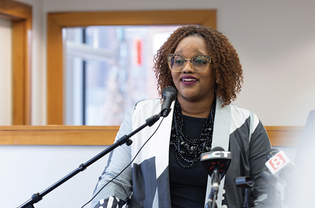
Dan Renzetti
Dawn Leaks Ragsdale will put her entrepreneurial experience to work to increase opportunities in New Haven.
View full image
At a City Hall press conference in November 2021, town and gown top brass jointly announced a suite of commitments toward a Yale–New Haven partnership for a “new generation.” Along with an increased payment in lieu of taxes and other measures, Yale promised to spend $5 million to establish a new Center for Inclusive Growth, meant to help the local economy deliver equitable returns for everyone who calls the Elm City home. On March 5 of this year, the university named entrepreneur Dawn Leaks Ragsdale as the center’s inaugural executive director.
Ragsdale started her own coaching and consulting business in 2012, merged that with a larger media venture, and sold the company in 2020. Originally from Springfield, Massachusetts, she moved to New Haven early in the pandemic to quarantine with her boyfriend—now husband—and wasted no time embedding herself in the Elm City startup space. In January 2021, she began running the New Haven startup accelerator Collab. Cofounded by Caroline Tanbee Smith ’14, ’25MBA, and Margaret Lee ’14, Collab provides technical support to local startups, with an emphasis on confronting racism and sexism.
Based on her experience leading Collab, Ragsdale says there are some structural gaps in New Haven’s entrepreneurial ecosystem she hopes to rectify in her new role. “After people leave programs like Collab,” she says, “there needs to be some continuation of support that helps people scale up to the next level. I think the Center for Inclusive Growth is a perfect answer.”
Against the backdrop of a pandemic exacerbating a historically fraught relationship, the 2021 announcement cemented Yale’s status as the most generous university in the country in terms of voluntary tax contributions. Still, New Haveners have long questioned whether the university’s olive branches have materialized into bona fide economic empowerment. In 1990, when Yale first started making voluntary payments to the city, the Connecticut comptroller’s office reported that roughly 21.3 percent of New Haveners lived below the poverty line. As of last year, that number had risen to 25.3 percent.
“I think that’s the work of the center,” Ragsdale says, “to make sure that it’s accessible, that people understand what it is. I do know the term ‘inclusive growth’ can seem a little nebulous, but our work will be to ensure that people understand what it is, what we’re doing, and how they can access it.”
Ragsdale is currently working on ensuring that the center’s offices at 65 Audubon Street will be fully staffed, with a clear mission statement and strategic direction. “No matter who I’ve talked to so far here, during my time in New Haven, business, community, city, entrepreneurs, whoever it is, there is a desire and a willingness to come together and to make sure that New Haven is a more equitable place for everyone,” she says. “And that doesn’t exist everywhere.”
 loading
loading